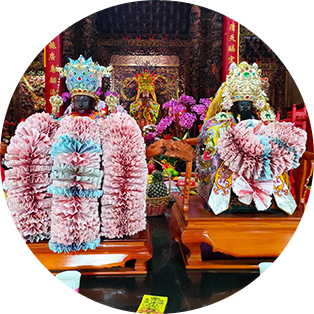



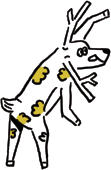
There’s always a reason to celebrate in Pingtung, with festivals held all year round. So, consider this your invitation to come party with the gods at some of Taiwan’s most vibrant celebrations, such as the lantern festival, the city wall firecracker ceremony, and the Bai Xin Ding festival. Get to know the goddess A-Hou (Pingtung) Mazu, the local deity Tudigong, the protective Wang Ye Gong, and even Grandmother Wang Ye (also known as Ong-ia Ma in Taiwanese Hokkien). They keep the party going day and night with colorful parades and daring performances, all in a beautiful historic setting. All this fun is sure to work up an appetite, and there’s no better way to satisfy your hunger than by visiting the local night markets. Let’s get the party started!
Pingtung City at night is a completely different experience compared to the day. Decorative lanterns line the riverbanks during the Festival of Lights, lighting walking paths in pretty lights. If you head over to the Craftsman Residential District you can see the creativity of young artists on full display. Finally, make your way to the Pingtung Night Market and try the Shantou hot pot, a favorite of the locals.
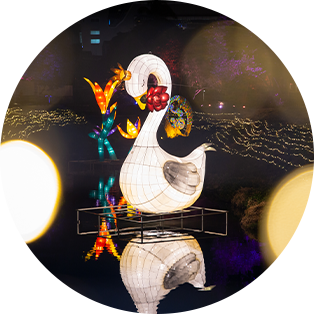
The Hengchun Peninsula is the place to be for the Lantern Festival at the beginning of the Lunar New Year. You can visit Liugenzhuang and take part in the Bai Xin Ding ceremony, which is an old Hakka tradition of praying for blessings for newborn sons. In Linzinei you can watch brave young men carrying gods on palanquins through a barrage of firecrackers. Linluo Township hosts a massive welcoming of the gods ritual. Or you can watch the ceremony of the firecrackers on the city walls in Wugousuei. The festive atmosphere is strong in these old Hakka villages that have kept their ties with the past.
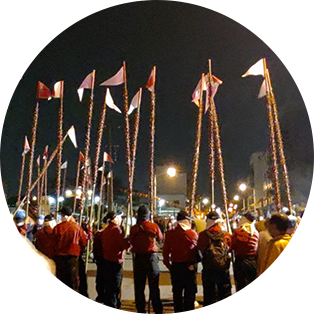
Donglong Temple was built to honor the god who protects sailors at sea, Wen Wang Ye, whom the people of Donggang affectionately call Wang Ye Gong (Grandpa Wang Ye). In the local folk religion, he is the most important of the gods and is celebrated once every three years with the Ying Wang Festival. A great wooden ship is built specially for the festival, and the final event of the ceremony, the sending off of Wang, ends with the magnificent boat engulfed in a roaring fire. The whole spectacle can only be truly appreciated by witnessing it in person.
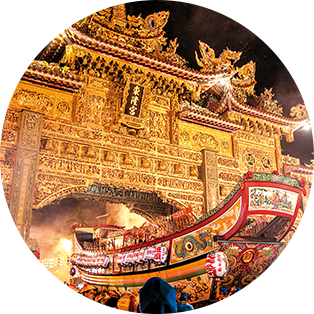
At the Hengchun Peninsula Song Festival, you can tour through all of Hengchun and listen to its unique musical sound. From the old hometown of Hengchun folk legend Chen Da to the ancient Hengchun kiln and city wall, from Hengchun’s old streets to all its best sightseeing spots, there are some parts of the local culture that just can’t be seen with the eyes. But open your ears, and you’ll hear them clearly.
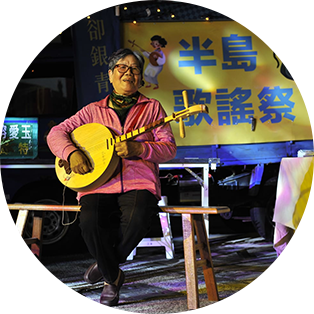
The Hengchun Peninsula also has its own charming hot spring townships. Nestled in the mountain forests of Checheng Township on the western side of the Central Mountain Range are the Sichongxi Hot Springs. And on the eastern side of the range, perched on the hills above the ocean, is the Xuhai Hot Spring in Mudan Township. As you soak in the sodium bicarbonate-rich waters of the hot springs, you’ll feel mother nature melting away the stress of the world.
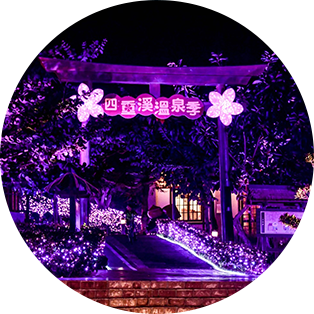
Pingtung’s unique belief in Wang Ye was formed by the legend of a fated marriage between a human and a god, which also created the extended family of Jiuru Township’s Minnan people and Linluo Township’s Hakka people. During the Lantern Festival, both communities jointly hold the “Reunion with Grandmother Wang Ye” celebration. From the god’s tour of inspection, when a team of palanquin carriers takes the god through both townships, it becomes clear why they are known in Taiwan as Uncle Jiuru and Uncle Linluo. With their close cultural ties on display, the townships are like relatives by marriage.
